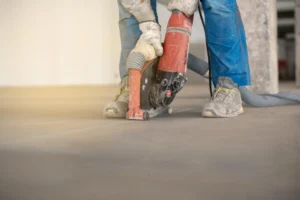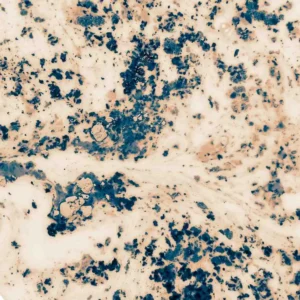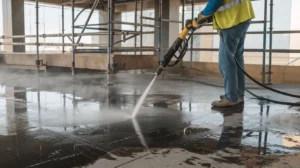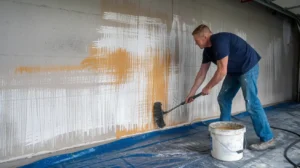Granite is a beautiful and durable material that adds elegance and sophistication to any home, especially in kitchens and bathrooms. However, like any surface, granite countertops can develop stains over time due to daily use. If you’re wondering how to get stains out of granite, you’re not alone. Whether it’s water marks, grease, or food spills, knowing the right methods to treat stains can help preserve the beauty and integrity of your granite surfaces.

How and Why Does Granite Stain?
Granite is a porous stone, meaning it has tiny pores and fissures that can absorb liquids, oils, and food particles. While it is more resistant to stains than some other natural stones, it is not completely immune. Staining occurs when liquids like water, coffee, wine, or oils seep into these pores and leave marks behind.
Water stains often result from water droplets left to sit on the surface, while grease and oil stains may be caused by cooking spills. Rust and food stains are another common issue, often caused by acidic foods or beverages. Fortunately, with the right methods, these stains can be removed and prevented.
Materials Needed
Before you begin the process of removing stains, gather the following materials:
- Baking soda
- Dish soap
- Hydrogen peroxide
- Soft-bristled brush
- Clean, soft cloth
- Plastic wrap
- Lemon juice
- Razor blade (optional)
- Stone care products (granite cleaner, stain removers)
How to Get Water Stains Out of Granite
Water stains on granite countertops are one of the most common issues homeowners face. These marks typically appear as light rings or patches on the stone. Water stains are caused by mineral deposits left behind when water evaporates.
Steps to remove water stains:
Clean the surface: Wipe down the area with a mild dish soap solution and warm water. Use a soft cloth to avoid scratching the granite.
Baking soda paste: Make a paste of baking soda and water. Apply it to the water stain, ensuring it covers the entire mark.
Cover and let it sit: Cover the paste with plastic wrap to keep it moist, and let it sit for a few hours or overnight. This helps lift the stain from the stone.
Rinse and dry: Remove the plastic wrap and gently scrub the paste off with a soft-bristled brush. Rinse with clean water and dry with a cloth.
This process should effectively clean water stains from granite countertops and restore their original shine.
How to Get Grease Stains Out of Granite
Grease stains, often caused by cooking or food preparation, can be more challenging to remove due to the oil’s tendency to seep into the granite.
Steps to remove grease stains:
Dish soap solution: Mix a few drops of dish soap with warm water. Soak a clean cloth in the solution and apply it to the grease stain.
Baking soda paste: If the stain persists, apply a paste made from baking soda and water to the affected area. Let it sit for 15-20 minutes.
Scrub gently: Use a soft-bristled brush to scrub the area, applying light pressure. Be careful not to scratch the surface.
Rinse and dry: Once the stain is gone, rinse with clean water and wipe the area dry with a soft cloth.
If the stain remains, consider using a specialized granite stain remover, which is formulated to break down grease and oil.
How to Get Oil Stains Out of Granite
Oil stains can be tricky to remove from granite, but with the right approach, they can be eliminated.
Steps to remove oil stains:
Blot the stain: First, use a clean cloth to blot away any excess oil. Avoid rubbing, as this can spread the stain.
Baking soda poultice: Mix baking soda with water to create a thick paste. Apply the paste over the oil stain and cover it with plastic wrap.
Let it sit: Allow the poultice to sit for 24 hours. The baking soda will absorb the oil from the granite.
Scrub and rinse: After 24 hours, remove the plastic wrap and gently scrub the area with a soft-bristled brush. Rinse with clean water and dry.
For stubborn oil stains, hydrogen peroxide can be used to break down the oil, but use it sparingly and test it on a small, inconspicuous area first.
How to Get a Rust Stain Out of Granite
Rust stains are caused by iron-containing materials coming into contact with the granite. While not as common as other stains, rust marks can be tricky to remove.
Steps to remove rust stains:
Make a paste: Mix equal parts of baking soda and water to create a thick paste.
Apply the paste: Apply the paste to the rust stain and cover it with plastic wrap. Let it sit for several hours.
Scrub gently: After removing the plastic wrap, use a soft-bristled brush to scrub the area.
Rinse and dry: Rinse the area with clean water and wipe it dry.
For tough rust stains, you can use a rust remover specifically designed for granite. Always test any cleaner in a hidden area first.
How to Get Coffee Stains Out of Granite
Coffee stains are common in kitchens, but they can leave noticeable marks on granite surfaces.
Steps to remove coffee stains
Blot the stain: Immediately blot the coffee stain with a clean cloth to absorb excess liquid.
Dish soap and water: Mix a small amount of dish soap with warm water and gently clean the stain with a soft cloth.
Baking soda paste: If the stain remains, apply a paste of baking soda and water to the coffee stain. Let it sit for 15-20 minutes.
Scrub and rinse: Gently scrub with a soft-bristled brush and rinse with clean water.
How to Remove Food Stains
Food stains, such as those from fruits or sauces, can also stain granite if not cleaned up quickly.
Steps to remove food stains
Blot the stain: Use a clean cloth to blot the stain, absorbing as much liquid as possible.
Soap and water solution: Clean the area with a mild dish soap and water solution.
Baking soda paste: For stubborn food stains, apply a paste of baking soda and water and let it sit for 15-20 minutes.
Scrub and rinse: Use a soft-bristled brush to gently scrub the area and rinse with water.
How to Remove Wine Stains
Red wine can leave deep stains on granite, especially if left for a prolonged period.
Steps to remove wine stains:
Blot the stain immediately: As soon as you notice the stain, blot the area with a clean cloth to absorb as much wine as possible.
Dish soap and water: Clean the stain using a mild dish soap and warm water solution.
Baking soda paste: Apply a paste made from baking soda and water to the stain. Let it sit for 15-20 minutes.
Scrub and rinse: Gently scrub with a soft-bristled brush and rinse with clean water.
How to Remove Stubborn Stains
Some stains can be particularly stubborn and require extra attention.
Steps for tough stains:
Use a poultice: For persistent stains, use a poultice made from baking soda and water. Apply it to the stain, cover it with plastic wrap, and let it sit for several hours or overnight.
Rinse and dry: After removing the poultice, gently scrub the area and rinse with clean water.
How to Prevent Stains on Granite
Preventing stains on granite countertops is much easier than removing them. Here are some steps to keep your granite looking pristine:
Seal your granite: Regular sealing helps prevent stains by reducing the stone’s porosity. Granite should be resealed every 1-2 years.
Clean up spills quickly: Wipe up spills immediately, especially for acidic foods or drinks.
Use placemats or cutting boards: Protect the surface by using placemats, cutting boards, and trivets when placing hot or acidic items on the countertop.
Daily cleaning: Use a mild granite cleaner daily to maintain the shine and prevent grime buildup.
When to Seek Professional Help
While the cleaning methods outlined in this guide are highly effective for most stains, they may not always resolve every issue. Rust stains, for example, can be particularly stubborn and may require professional assistance.
If you’ve tried the recommended methods and are still faced with an unsightly stain on your countertop, it’s a good idea to reach out to a professional for further guidance. Similarly, if the problem is etching rather than a stain, a professional will be needed to address the issue properly.
If you need expert help, don’t hesitate to contact us for professional assistance.
Conclusion
Knowing how to get stains out of granite countertops is crucial to maintaining their beauty and durability. By following the right methods for each type of stain and adopting good maintenance habits, you can keep your granite surfaces looking like new for years to come.
Frequently Asked Questions
Can stains be removed from granite?
Yes, most stains can be removed from granite with the right cleaning methods and products.
Does granite stain permanently?
No, granite stains are usually not permanent. Most stains can be removed with the proper treatment.
Does hydrogen peroxide remove stains from granite?
Yes, hydrogen peroxide can help remove stains, particularly for oil and organic stains, but it should be used with caution.
Can discolored granite be fixed?
Yes, discoloration can often be fixed with a poultice or professional cleaning.





